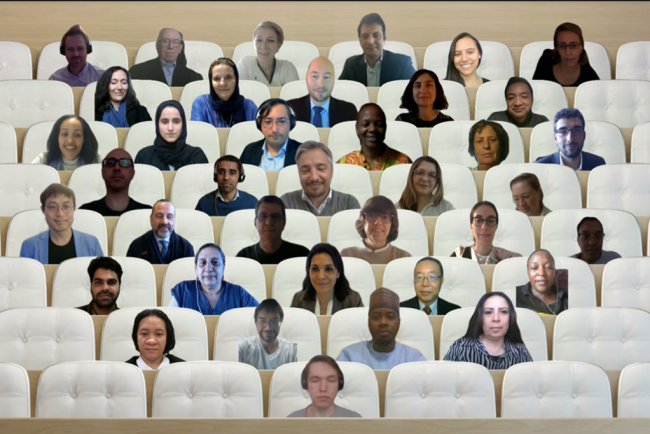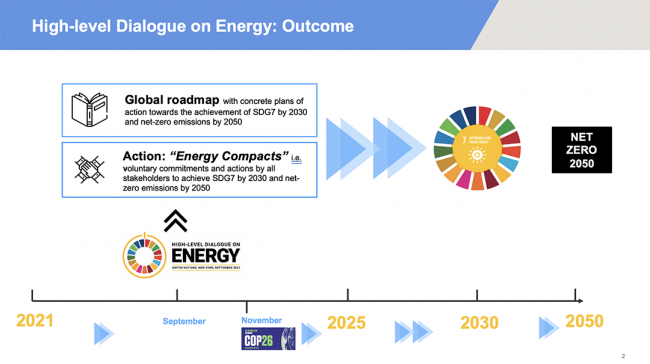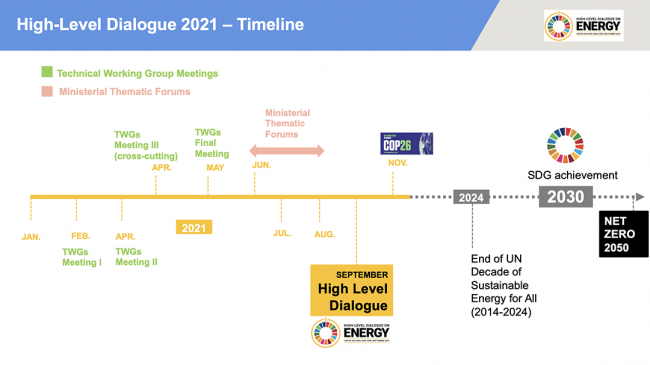Participants in the first meeting of the Technical Working Group on Energy Transition shared ideas on key sectors and actions the Working Group should include in its recommendations for a roadmap to achieve the global energy goals included in the 2030 Agenda for Sustainable Development and the Paris Agreement on climate change.
Opening Statements
Francesco La Camera, Director-General, International Renewable Energy Agency (IRENA), welcomed 82 participants to the virtual meeting, and highlighted the opportunity to accelerate the energy transition as we recover from the COVID-19 pandemic.
Minoru Takada, Team Leader, Secretariat of the High-level Dialogue on Energy, UN Department of Economic and Social Affairs, introduced the objectives of the Working Group, highlighting that the Dialogue, to be convened by the UN Secretary-General at the summit level in September 2021, is the first global meeting on energy under UN General Assembly auspices since 1981. He recalled that five Technical Working Groups will consider five themes in preparation for the High-Level Dialogue. Each Group will seek to identify roadmaps and pathways to achieve Sustainable Development Goal (SDG) 7 (clean and accessible energy) by 2030 and net-zero emissions by 2050, as called for in the Paris Agreement on climate change. The Technical Working Groups will complete their work by May 2021, with their reports feeding into five Ministerial thematic forums later this year.
Representatives from two of the UN agencies serving as co-leads for the Technical Working Group on Energy Transition (IRENA and the UN Environment Programme, UNEP) presented the Working Group’s concept note and suggested that participants focus on the following:
- What are the main opportunities and challenges of energy transitions?
- What are the main levers for accelerating action?
- How can changes in patterns of energy demand minimize the challenges and possibilities of stranded assets?
- What advances are needed for successful energy transitions?
- What measures and policies can encourage investment where it will have the most positive impact?
- What tools and processes can help countries accelerate energy transitions and promote global solidarity to leave no one behind?
Open Discussion
During the open discussion, Technical Working Group Members, Member State Global Theme Champions, and UN-Energy Member Organizations offered suggestions for focus areas and priorities for the recommendations the Working Group will develop.
Many speakers emphasized the need to reflect the sense of urgency for achieving an energy transition. They highlighted that renewables and energy efficiency are well-known solutions, but the need to push for progress to achieve the global goals should be underscored.
Speakers stressed that a just transition should incorporate social and economic considerations, with the principles of equity and leave no one behind as guides for the phase-out of fossil fuels and transition to new energy sources.
Africa’s Agenda 2063 was highlighted as a guiding document alongside the 2030 Agenda and the Paris Agreement. Another speaker called for contextualizing what we mean by “energy transition,” noting that some countries need to build their energy systems. The need for clean cooking options in Africa was also stressed.
Many noted e-mobility and energy use in buildings should be priority sectors, especially for energy efficiency investments and deployment. Others highlighted efficiency for motors, and the cement, steel and chemicals sectors.
The need to modernize the energy grid was raised, with several speakers pointing to the current failures in the US state of Texas as an example of the need for strong regional power markets. New opportunities for intra-African trade with the commencement of the African Continental Free Trade Area were discussed in this regard.
With regard to the challenges of integrating renewable energy resources into electricity infrastructure, participants were encouraged to consider addressing the opportunities for co-ownership of municipal electricity systems to allow citizens to invest in their own electricity infrastructure. Another speaker noted that the energy transition is often thought of as a matter of private sector investment and supported a focus on ownership and not just job creation. The value of green jobs for youth was also mentioned, to build back better with a generation that has meaningful jobs.
Participants stressed the need for information sharing and public awareness campaigns in both developed and developing countries. For example, one speaker suggested that renewable technologies are perceived to be more technologically challenging, which impedes their adoption.
The value of public policy with clear targets, including interim targets on the road to 2030 and 2050, was also discussed.
Speakers called for incorporating energy sources such as bioenergy and hydrogen into the Working Group’s recommendations. Energy storage solutions, including batteries, were also highlighted. A speaker suggested that carbon capture, utilization and storage (CCUS) should be pursued during the transition from fossil fuels.
Conclusion and Next Steps
Hongpeng Liu, Director, Energy Division, UN Economic and Social Commission for Asia and the Pacific (UNESCAP), summarized the discussion, noting the sense of urgency, the need to consider whole value chains, and the importance of continuous innovation. He highlighted calls to ensure the transition is resilient and to use the opportunity to build back better to achieve low carbon development.
Technical Working Group members were asked to submit written inputs by 15 March 2021. The next meeting of the Group will take place on 12 April. The Group will conclude its work the week of 17 May.
The first meeting of the Technical Working Group on Energy Transition convened virtually on Monday, 22 February 2021, from 8:00 to 10:30 am EST (GMT-5).
To receive continuing coverage of this event delivered to your inbox, subscribe to the ENB Update newsletter.











